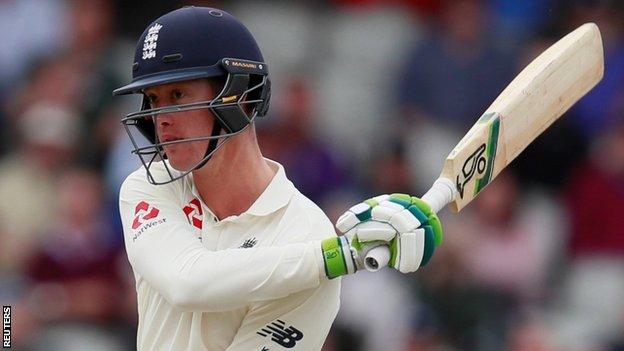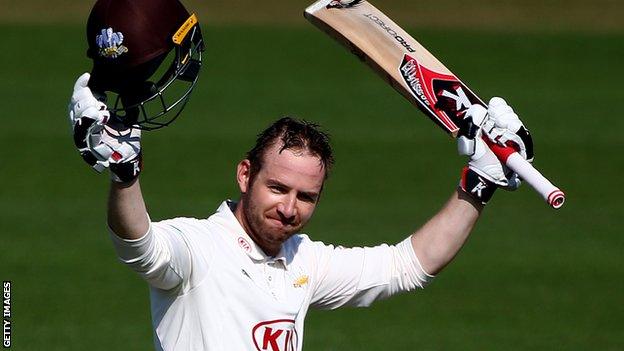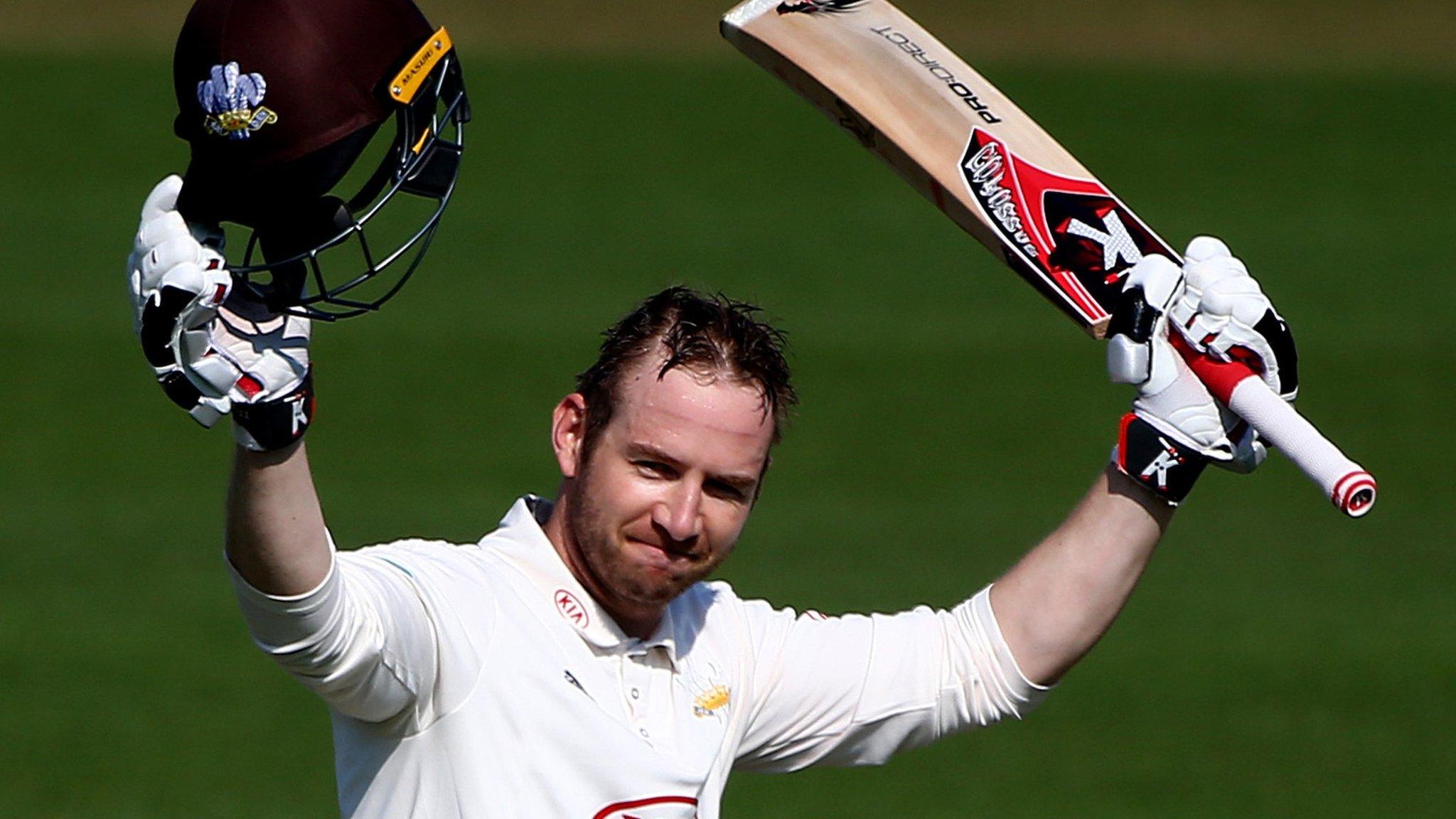England v West Indies: How to handle the threat of being dropped
- Published
- comments

Keaton Jennings scored 127 runs in eight innings against South Africa
I watched England's final Test against South Africa and really felt for Keaton Jennings.
He has not scored the runs, and his technical difficulties around fourth stump have not withstood the severe cross-examination of the high-profile media pundits who fuel the opinions of so many others in and around the sport.
It's a tough place to be - knowing you are good enough to excel but feeling so out of form, and feeling your chances of success are diminishing innings by innings, partly because of the unwelcome focus on you when the selectors' guillotine is hovering over your head.
The only way to rid yourself of it is to score big runs.
Hopefully Jennings can find his best form again for Durham and return for England's Ashes tour this winter. He may even discover that his style of play is better suited to Australian conditions.
The England selectors will have debated whether or not to allow him an extended spell in the team.
Maybe he would have come through the experience a better player? But playing with the axe hanging over you is not helpful to recovering your best form.
I felt in May of 2013 that if Alastair Cook and I had the opportunity to open together for the whole summer, we could have made a real go of the job.
The lack of backing I received was because of my poor performances against New Zealand, but I reckon if I could have been allowed to move through that challenging learning experience of my first real dip in form as an England player, I would have been better for it.
After all, my partnership with Cook was a success in terms of the runs we put on together, and the team was winning matches and series.
Moving through the difficult learning process of being a newcomer to Test cricket is not straightforward and, should a player receive the full support of selection when experiencing a dip in form, it offers a healthy return on the investment of your initial selection.
Very few players experience a consistent graph of top performance in their first 15 Tests, but the best ones benefit from the exposure and learning over time. After all, South Africa's Jacques Kallis did not enjoy the best of starts to his Test career and look what happened to him.

Mark Stoneman averages 59.14 in the County Championship for Surrey this season
Now the focus of attention is on Mark Stoneman, who looks set to become England's oldest debutant this century when England face West Indies in the first Test at Edgbaston on Thursday.
England's selectors have received much criticism for the number of players coming and going since the days of Geoff Miller when the panel embraced a 'consistency and continuity' policy.
Rather than blaming the selectors, it is ultimately down to players to be in charge of their own destiny and make the most of any chance that comes their way.
If anyone is looking for a scapegoat for England's recent problems at the top of the order, then I can recommend pointing the finger at me.
If I had taken my first chance with both hands in 2013 as Andrew Strauss' replacement, none of this revolving door of opening partners for Cook would have followed!
I was given my debut ahead of Joe Root in India in 2012. But seeing him flourish as a world-class player who could become an all-time great, I am able to contrast our journeys and really appreciate his qualities, having lived through the challenge of trying to become a top-level batsman at the same time.
I would like to offer my good wishes to Stoneman and others who have the chance to live out their childhood dreams by representing their country.
And, of course, I wish their experience in the England team enables them to be more Joe Root than Nick Compton.
So here is my open letter to emerging England cricketers to help avoid the fear of being dropped:
1. Score big runs
Scoring big runs is the only currency which will keep the harsh spotlight away from impacting your game negatively.
However good or bad you may be feeling about your game, you have to find a way to produce performance.
2. Be self-reliant
Despite the well-intentioned advice from many good people in and around the England team, it is vital you make peace with the reality that as a player you are on your own.
You are a professional in your own right, and must retain belief in your own way of getting the job done.
When I played for England, I was fortunate to receive kind support from greats such as David Gower, Mike Atherton and Geoffrey Boycott to name a few.
But when the time comes to go out to bat, no-one else can score your runs for you. As much as there are coaches there to help you prepare for Tests, they cannot know your game and your personality as well as you do. Trust yourself.

Nick Compton (left) averaged 28.70 in 16 Tests between 2012 and 2016
3. Respect the excellence of the opposition bowler
Recognise that bowlers are top professionals too. They are also under the microscope and when conditions are in their favour, they can 'tighten up' too, which can ease the pressure on you.
Also, acknowledge that when you as a batsman fail, it does not necessarily mean you are not good enough for Test level - sometimes it is down to the skill of the bowler revealing his class. Even Sir Donald Bradman made low scores sometimes.
4. Pay attention to analysis but don't overdo it
Video footage works both ways - for a batsman you can familiarise yourself with opposition bowlers as much as they may try to exploit flaws in your game too.
Too much video can be counter-productive, and you can lose your 'feel' if you get too technical.
And sometimes it is of more value to listen to the words rather than look at the pictures because some of the wisdom shared by former greats can be very helpful.
For example, some modern coaches may try to 'soft-soap' you to boost your confidence and convince you that you got an unplayable ball (when you didn't), but some of the sharper comments in the media may offer a more accurate analysis.
5. Understand the media are just doing their job
Stay focused on playing well. A resentment may develop in you should a former England cricketer have a pop at your technique (or character) in the media.
Instead, just take it in the context of it being their job to do so - don't take it personally. Deep down, every journalist and former player wants England to succeed.
6. Develop a broad perspective
My final recommendation is to develop a broad perspective of life. Enjoying a life outside of cricket is vital to retaining your freshness.
In reality, as much as performance matters so much to you as an individual, there is so much more that matters than scoring runs and the England cricket team winning matches and series.
- Published10 August 2017

- Published7 August 2017

- Published7 August 2017

- Published21 September 2017
